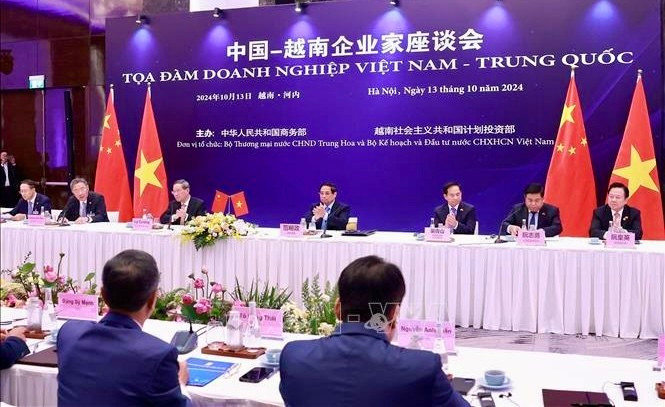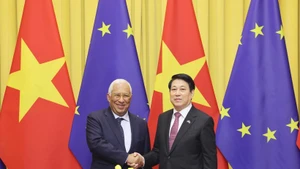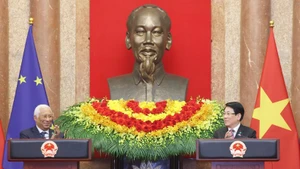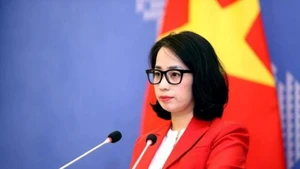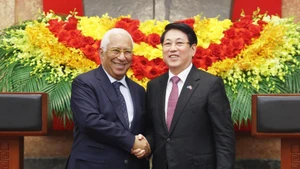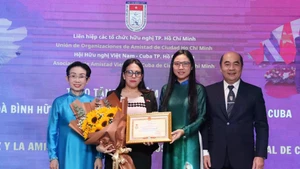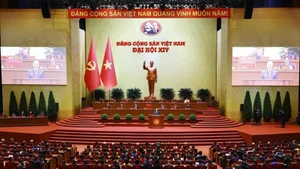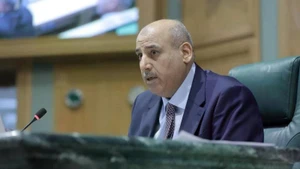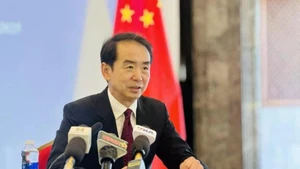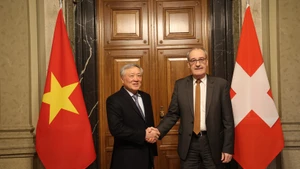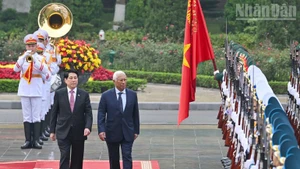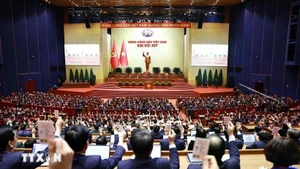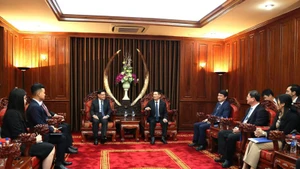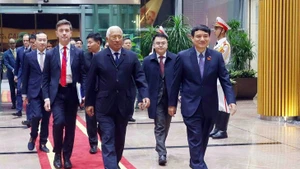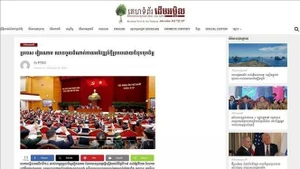* Fostering cooperation in infrastructure, digital economy, finance, energy
Chinese enterprises, leveraging their extensive experiences and capabilities, expressed their keen interest in Vietnam's infrastructure development projects, including railway connections with China, urban railways and the North-South high-speed railway in Vietnam, construction of smart cities, manufacturing and data centres, and e-commerce.
Vietnamese companies urged both governments to facilitate business connections, particularly in areas where China's experience and resources align with Vietnam's needs. They sought cooperation in financial resources, sci-tech and management for infrastructure development, as well as funding, payment connectivity, 5G networks, digital infrastructure, AI, and renewable energy.
In his address, Chinh described sustainable economic development as a pillar in tightening solidarity between the two fraternal and neighbouring countries.
He suggested the two governments further promote connections in institutions, strategic infrastructure, governance and technology transfer, human resources training, capital, payment and supply chains.
Enterprises were asked to actively and proactively connect and support each other on the back of the fine political relationship between the two countries, in the spirit of "harmonising benefits and sharing risks," and "ensuring harmonious interests of the State, the public and businesses".
* Vietnam commits to facilitating businesses' operations
Vietnam is committed to fostering a long-term, stable, and fair competitive environment for foreign-invested sector, protecting the legitimate rights and interests of investors while not criminalising civil and economic relations, and making continuous improvements to the business environment, he said.
Chinh also pledged to create seamless infrastructure, transparent mechanisms and smart governance, along with better understanding between businesses, the Government and the public; shared visions and actions to support rapid and sustainable development, and joint work to win together.
The PM asked businesses from both countries to engage in proactive cooperation and dialogue, aiming to provide constructive recommendations to government agencies, ministries and local authorities. This collaboration is intended to remove barriers to production and trade, improve the investment climate and refine institutional, regulatory and policy frameworks.
Relevant ministries, localities and businesses from both nations were encouraged to launch concrete projects within the established bilateral frameworks, such as the Vietnam-China Community with a shared future that carries strategic significance, the Belt and Road Initiative (BRI), Global Development Initiative (GDI), Global Security Initiative (GSI), and Global Civilisation Initiative (GCI), as well as multilateral mechanisms joined by both countries, like ASEAN-China and the Regional Comprehensive Economic Partnership (RCEP).
Chinh underlined the need to further connect the two economies, with a focus on strategic connectivity across various sectors, including transport infrastructure, and railways between Vietnam and China. He called for Chinese investments in Vietnam, especially in key sectors where China has strengths, such as hi-tech, digital transformation, transport infrastructure, metallurgy, health care, education, clean energy, climate change mitigation, and electric vehicle and battery ecosystems.
He requested China to facilitate the participation of Vietnamese companies in the supply chains and value chains of Chinese corporations, and continue to boost two-way trade by expanding the imports of Vietnamese goods, including agricultural and aquatic products. Furthermore, he underscored the importance of investing in digital and green economy, as well as in technology transfer to drive sustainable development.
* Continuing to connect development strategies
Addressing the event, Li expressed his appreciation for the remarks by Chinh and agreed on the two governments’ support to businesses of the two countries.
He emphasised that Vietnam and China are not only good brothers but also good and reliable partners who can rely on each other, saying with unity, the two countries can overcome all challenges and risks.
The Chinese leader said cooperation needs sincerity, and that as long as both nations continue moving in the same direction, bringing mutual benefits and shared prosperity, they will achieve win-win outcomes.
Reflecting on economic and trade cooperation, which is always a highlight and a vital driver of the bilateral relations, Li reaffirmed that China remains Vietnam’s largest trading partner.
He noted that there remains ample room for further growth in the economic and trade ties, and outlined three key focus areas for future cooperation, beginning with the need to align the two countries' development strategies.
According to the Premier, Vietnam and China share similar development viewpoints and broad common interests, which facilitate the bilateral connectivity. He also noted the ongoing efforts to integrate China's Belt and Road (BRI) initiative with Vietnam's "Two Corridors, One Belt" framework, to enhance infrastructure connectivity, including roads, railways, border gates, seaports, and airports, and people-to-people exchanges, and to intensify policy coordination in industrial development.
The leader suggested the two sides continue consolidating and complementing each other's strengths as they have their own advantages in terms of natural resources and industrial structure. He said the two sides have made significant progress in technical and technological collaboration, advancing their competitiveness in global value and supply chains.
According to the Premier, China has strengths in wind and solar energy, and leads the world in electric vehicles, matching Vietnam’s energy transition needs. These areas present opportunities for mutually beneficial cooperation, he said.
Li further emphasised the deep political trust and close friendship between the two countries, which is rarely found in other relations.
Vietnam and China share strong confidence in future cooperation, and their bilateral trade has been strengthened, he said, suggesting businesses of both countries seize opportunities and foster cooperation for common development.
Li expressed his hope that the two sides will focus on major policies and proactively integrate their national development and strategic connections; optimise bilateral and multilateral agreements; and mobilise resources for development.
They should ensure that industries grow harmoniously based on the unique strengths of their enterprises, and seek partnerships within the value chain, he continued.
The Chinese Government encourages businesses to connect with Vietnamese companies to build cross-border production and supply chains, with attention to creativity and development in clean energy sectors, Li said.
The Premier concluded by expressing his belief that the bilateral economic and trade ties will achieve even greater success in the near future.
